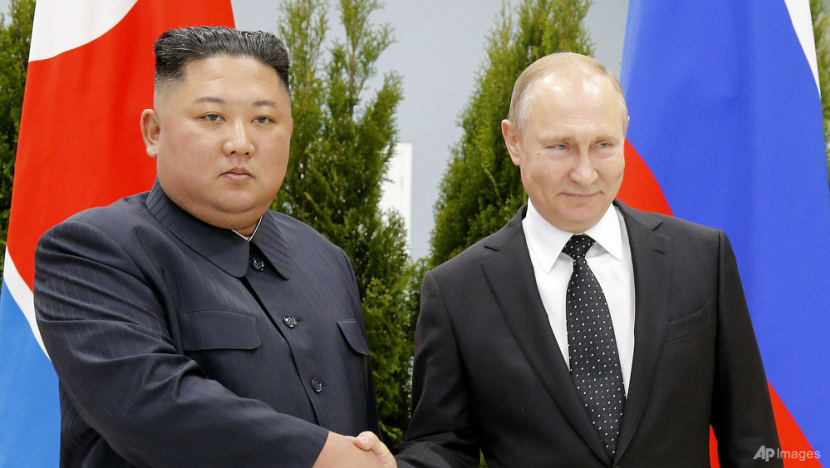Commentary: If Putin needs North Korean weapons, he’s in trouble
Russia seeking to buy North Korean ammunition reflects its diplomatic isolation and military shortages arising from its war on Ukraine, says Pusan National University’s Robert Kelly.

BUSAN, South Korea: Russian President Vladimir Putin may soon meet North Korean leader Kim Jong Un in the Russian far eastern city of Vladivostok. News reports suggest the summit’s purpose is a trade of North Korean ammunition for Russian military technology.
If true, this would be a remarkable meeting. It would be particularly indicative of Russia’s sorry state - diplomatic isolation, military shortages and sanctions-driven economic troubles - due to the Ukraine war.
For North Korea though, the meeting is likely a boon. Great power recognition is always attractive to shunned North Korea, and Russia has technologies North Korea cannot hope to develop indigenously.
THE UKRAINE QUAGMIRE
The summit’s most important revelation for analysts is Russia’s desperation for military goods, particularly ammunition. Reports suggest that Russia is seeking artillery shells and anti-tank weapons.
North Korea produces these items, but surely not as well as Russia’s post-Soviet defence industry. North Korea is notorious for its economic dysfunction, corruption and low technological level. Most analysts believe that North Korea’s conventional military is no match for South Korea and the United States, hence its construction of nuclear weapons.
That Russia is nonetheless seeking to buy presumably sub-standard weapons from a backward economy like North Korea is rather startling. This means that Russia’s own high-quality arms sector is unable to keep up with the quantitative demands of the war.
Modern warfare is known for its huge appetite for ammunition, an issue dating back to at least the American civil war. If Russia is buying ammunition from a low-quality producer like North Korea, that strongly suggests severe shortages at home.
It also suggests that Russia is unable to produce high-end weapons, probably because of war-imposed sanctions. Russia would not purchase low-grade ammunition in bulk if it could produce more useful high-tech weaponry like drones or missiles. Will North Korean anti-tank missiles really pack the punch necessary to penetrate modern Western armoured vehicles?
This highlights Ukraine’s improving technical advantage in the war. Its Western-donated hardware is superior to Russian hardware and that problem seems to be worsening.
The good news for Russia is that North Korea’s military is modelled on the now-defunct Red Army of the Soviet Union. So North Korea weapons and ammunition should integrate relatively easily into the post-Soviet technologies used by the modern Russian army.
North Korea also likely has enormous stockpiles of ammunition. Its economy is highly militarised. It is probably happy to sell the one thing it manufactures in abundance - weapons.
THE SUMMIT’S UPSIDE FOR NORTH KOREA IS LARGE
Many of Russia’s partners have taken advantage of its Ukraine troubles to renegotiate their deals with Moscow. China and India have sought better terms for Russian arms and oil. North Korea will likely take advantage of Russia’s need to seek previously obtainable technologies.
Russia, like everyone else, knows how dangerous North Korea is. Russia and China have voted to sanction North Korea over its weapons of mass destruction (WMD) in the past.
Russia and China do not want Southern-led unification of the Korean peninsula, but they are also nervous, like the rest of the world, about a spiralling, unchecked North Korean nuclear missile programme.
As a result, Beijing and Moscow have often turned down North Korean requests for advanced technologies. Fear of the rogue, paranoid Pyongyang regime, and its willingness to use WMDs, stays their hand.
But if Mr Putin and Mr Kim meet this September, the latter will have leverage. China will not jeopardise its larger, more important relationship with Western importers to help Moscow too much. But North Korea has few relationships to jeopardise. It is already ostracised and has nothing to lose.
North Korea could conceivably direct its defence industrial base to produce conventional weapons for Russia for a while, given that its primary defence is now its nuclear weapons. A politically unconstrained supplier will be attractive to Mr Putin, and he will likely bargain for it.
This is the reason the US has publicly worried about the summit. It fears that Mr Putin, in his desperation, will trade away major Russian technologies which Moscow has previously feared to give Pyongyang. North Korea will probably deal aggressively to acquire these technologies.
Our knowledge of North Korea’s WMD limitations is mixed, but a few likely areas for trade include submarines, missile guidance and re-entry technology.
North Korea’s nuclear missiles are all terrestrially based now and sit on gantries and road-mobile launchers. They would be far more likely to survive a US-South Korean disarming strike if they were on submarines.
With targets on the other side of the world, North Korean missiles can likely reach the mainland US but it is not clear if Pyongyang has the ability to direct its missiles to specific points. The re-entry of a nuclear warhead into the atmosphere - after its journey through space - is very stressful and again, it is unclear if North Korea has mastered this.
WHAT NEXT?
Russian engagement with North Korea in such a swap would be a massive violation of the sanctions on North Korea. Mr Putin does not care about that, but the West will likely respond with yet more sanctions on Russia because of it. The US has also threatened retaliation against North Korea, but that is harder given how isolated North Korea already is.
The biggest response, instead, will likely be stepped up Western support for Ukraine in the war. The war is increasingly an arms race. Can Ukraine destroy enough Russian equipment to facilitate a breakthrough?
Russia cannot outproduce the West, so it is shopping in North Korea. The West will likely respond in kind.
Robert Kelly (@Robert_E_Kelly) is a professor of political science at Pusan National University.


















